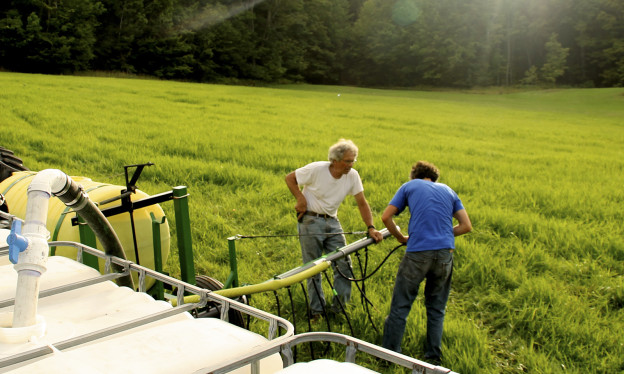Back to all Research Results
Agriculture
Research Question: How well does urine work as a fertilizer?
Dates: 2011-present

Some of the first research conducted at the Rich Earth Institute included two seasons of field trials using urine to fertilize hay. These trials demonstrated that hay fertilized with urine can produce yields on par with hay fertilized using synthetic fertilizer. Furthermore, fertilization with pure (undiluted) urine had no apparent adverse effect on the grasses studied, contrary to conventional wisdom that pure urine was too strong for direct application. There was no significant difference in yield between hay fertilized with pure urine vs. a urine/water mix, demonstrating that hay is not harmed by exposure to pure urine at agronomically appropriate application rates.
We have also tested adding urine to a variety of composting systems, and quantifying the nitrogen loss in the composting process. In our trials, nitrogen retention has ranged from 45-83%. To maximize the nitrogen value of urine it is better to apply urine and compost separately; however composting urine can also be a viable option when needed.
In 2018, we examined the impact of different urine application methods and pH treatments on ammonia volatilization (loss of nitrogen to the air through evaporation). We found that broadcasting (spraying) urine, as well as applying in dry conditions, resulted in greater nitrogen loss.
In 2020, we expanded our agricultural research to a variety of new crops, and evaluated different application methods, such as fertigation (adding urine to drip irrigation lines). We partnered with farmers to demonstrate urine fertilization of hemp, hay, figs, cut flowers, and corn, and completed a controlled fertigation evaluating the ability of three types of drip irrigation emitter to resist clogging. All the farmer-partners reported positive results from their experiments, with either comparable or better yields and/or robustness from their urine treated plants. One farmer reported increased cannabinoid content of his CBD hemp in a sample of his urine-treated crop, and another found increased potassium and micronutrients in his urine-treated corn as compared to controls. All indicated interest in further experimentation, and had suggestions for future research. The drip-irrigation trial showed that urine can successfully be delivered via fertigation either by mixing it with irrigation water or by delivering it in an alternating fashion with the irrigation water.
Details on past projects can be found in these project reports:
2020
Expanding Farm Partnerships to Trial Human-Urine-Derived Fertilizer on New Crops
2018
Practical Strategies for Reducing Ammonia Volatilization from Urine-Derived Fertilizers
2015
Value-added products from urine: Enriched compost and stabilized liquid fertilizer
2014
Urine as fertilizer: Maximizing hay yield and enriching low-N composts
2013
Sustainable fertilizer from reclaimed urine: A farm-scale demonstration for hay production

